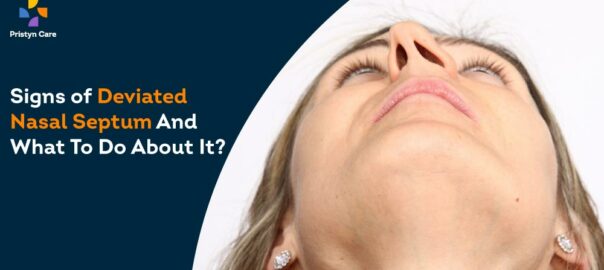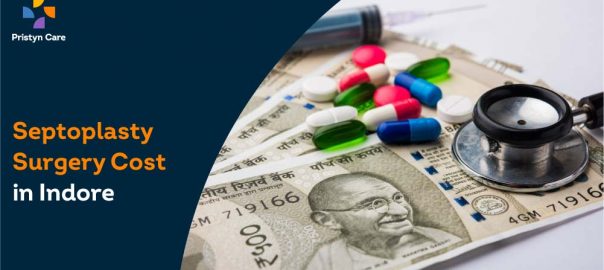![]() Views: 11,419
Views: 11,419
What To Expect After Septoplasty and Turbinate Reduction
More so, some of them answer that they have a hard time during the recovery process.
Dedicated Support at Every Step!
Our Doctors are available 24 hours a day, 7 days a week to help you!
Hence, this article includes the possible side effects that can occur after either a Septoplasty or Turbinate Reduction and what to do to ensure minimum risk of any complications.
Table of Contents
What are the possible side effects that can occur after Septoplasty and Turbinate Reduction?
There is a possibility that there can be some side effects after either a Septoplasty or Turbinate Reduction. Both surgeries largely involve removing a part of bone or tissue hence, the possible side effects cannot be ignored. Some of the possible side effects are-
- Pain
- Bleeding
- Swelling
- Irritation
- Dryness of the nasal passages
- Infection
No Cost EMI, Hassle-free Insurance Approval
How To Take Care After A Septoplasty or Turbinate Reduction?
During the discharge process after a septoplasty or turbinate reduction surgery at the hospital, ensure that you have all the answers to all your questions. Make sure you have facts related to any doubts-
- How to take care of the nose after the surgery?
- How much activity is permissible?
- What are the restrictions on driving?
- What are the symptoms to look out for that require immediate medical attention?
- If there are changes required for medicines and their proper dosage?
- What are the permissible exercises that can be carried out?
- How to manage pain?
- Is there any proper procedure to reduce the risk of infection?
Read More: What is Endoscopic Septoplasty?
Wound Care
- At least for a week after the surgery, avoid blowing the nose. However, if you feel like blowing it, do not try to hold it back. Instead, sneeze with your mouth.
- In the initial days of the surgery if there is bleeding from the nose for several days, tilt your head back and breathe gently through the nose. Simply dab the nose gently with the tissue.
- Nasal sprays available on the over-the-counter can be used to control nasal bleeding. However, remember that you see these for 2-3 days only. When these are used for long periods of time, it can make congestion worse.
- Rinse the sinuses with nasal wash which is simply the saline solution. This is an important tip to be followed during the postoperative care for patients. On the first day after the surgery itself, start with the irrigation. Irrigate the sinuses twice a day unless directed otherwise. Hence, this decreases the need for sinus cleaning during doctor visits. Children who have undergone Septoplasty or Turbinate Reduction should be careful with sinus irrigation.
- After the surgery, if a splint is placed then no need to irrigate the nose. Instead, keep the nose moist with saline sprays.
- Don’t worry if you have a stuffy nose or congestion after the surgery. This is a minor side effect that alleviates as the nose heals.
Medicines
- During the discharge, the doctor will prescribe pain relief medication. Take these as directed and when needed.
- Some people require extra-strength pain-killers such as Tylenol for pain relief. But, ensure that you do not take both prescribed pain-relieving medications and Tylenol together.
- Avoid taking aspirin or products that contain aspirin.
- For the first week after the surgery, do not take Non-Steroidal Anti-inflammatory Drugs or NSAIDs as they can cause bleeding.
- Do not use a Continuous Positive Airway Pressure or CPAP at night unless the ENT doctor instructs so.
Activity
- In the initial first 2 weeks of the recovery, do not fly or swim anywhere.
- Take at least 1 week off from work to recover from the surgery. If your work involves performing strenuous activities, then you should take a longer period of leave.
- For at least 2 weeks following the surgery, avoid exercising and limiting any exertion. This also involves no bending, lifting, or straining.
- Before starting exercising, consult your doctor.
General Instructions To Follow After Septoplasty or Turbinate Reduction
Here are some instructions that patients should follow to lower the risk of any complications.
- Rest properly throughout the day.
- To reduce the pain and swelling, apply an ice pack or a few ice cubes wrapped in clean cloth or towel near the wound.
- In order to reduce swelling and congestion, put two pillows under the head when you sleep at night.
- Do not take a shower for the initial 24 hours of the surgery.
- Stay indoors or prevent going to a crowded place to prevent catching an infection.
- Avoid putting extra pressure on the face while straining during bowel movements.
How long does it take to fully recover from a Septoplasty or Turbinate Reduction?
Usually, the patients after a Septoplasty or Turbinate Reduction with the assistance of advanced equipment can take a day or two to resume their daily chores. Additionally, for a full recovery after a septoplasty, it can almost take a week.
When To Call The Doctor?
The recovery period after any surgery is very crucial. Hence, apart from minor bleeding and pain if there are any other following symptoms, call the doctor immediately-
- A temperature of more than 101.5 F or higher
- Fever doesn’t come down for more than 24 hours
- Intensive pain
- Bruising on the face
- Bleeding from the nose even after using steroid nasal sprays
If you still have any more queries, consult with an ENT doctor from Pristyn Care who can brief you in detail about Septoplasty or Turbinate Reduction.
Read More:










